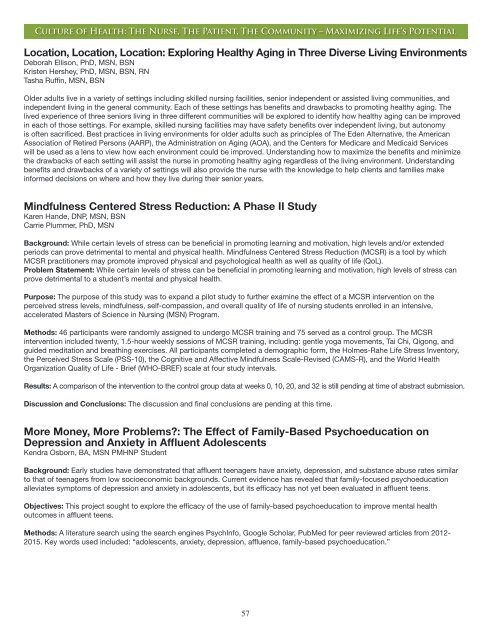2016 TNA–TASN Joint Conference
You also want an ePaper? Increase the reach of your titles
YUMPU automatically turns print PDFs into web optimized ePapers that Google loves.
Culture of Health: The Nurse, The Patient, The Community – Maximizing Life’s Potential<br />
Location, Location, Location: Exploring Healthy Aging in Three Diverse Living Environments<br />
Deborah Ellison, PhD, MSN, BSN<br />
Kristen Hershey, PhD, MSN, BSN, RN<br />
Tasha Ruffin, MSN, BSN<br />
Older adults live in a variety of settings including skilled nursing facilities, senior independent or assisted living communities, and<br />
independent living in the general community. Each of these settings has benefits and drawbacks to promoting healthy aging. The<br />
lived experience of three seniors living in three different communities will be explored to identify how healthy aging can be improved<br />
in each of those settings. For example, skilled nursing facilities may have safety benefits over independent living, but autonomy<br />
is often sacrificed. Best practices in living environments for older adults such as principles of The Eden Alternative, the American<br />
Association of Retired Persons (AARP), the Administration on Aging (AOA), and the Centers for Medicare and Medicaid Services<br />
will be used as a lens to view how each environment could be improved. Understanding how to maximize the benefits and minimize<br />
the drawbacks of each setting will assist the nurse in promoting healthy aging regardless of the living environment. Understanding<br />
benefits and drawbacks of a variety of settings will also provide the nurse with the knowledge to help clients and families make<br />
informed decisions on where and how they live during their senior years.<br />
Mindfulness Centered Stress Reduction: A Phase II Study<br />
Karen Hande, DNP, MSN, BSN<br />
Carrie Plummer, PhD, MSN<br />
Background: While certain levels of stress can be beneficial in promoting learning and motivation, high levels and/or extended<br />
periods can prove detrimental to mental and physical health. Mindfulness Centered Stress Reduction (MCSR) is a tool by which<br />
MCSR practitioners may promote improved physical and psychological health as well as quality of life (QoL).<br />
Problem Statement: While certain levels of stress can be beneficial in promoting learning and motivation, high levels of stress can<br />
prove detrimental to a student’s mental and physical health.<br />
Purpose: The purpose of this study was to expand a pilot study to further examine the effect of a MCSR intervention on the<br />
perceived stress levels, mindfulness, self-compassion, and overall quality of life of nursing students enrolled in an intensive,<br />
accelerated Masters of Science in Nursing (MSN) Program.<br />
Methods: 46 participants were randomly assigned to undergo MCSR training and 75 served as a control group. The MCSR<br />
intervention included twenty, 1.5-hour weekly sessions of MCSR training, including: gentle yoga movements, Tai Chi, Qigong, and<br />
guided meditation and breathing exercises. All participants completed a demographic form, the Holmes-Rahe Life Stress Inventory,<br />
the Perceived Stress Scale (PSS-10), the Cognitive and Affective Mindfulness Scale-Revised (CAMS-R), and the World Health<br />
Organization Quality of Life - Brief (WHO-BREF) scale at four study intervals.<br />
Results: A comparison of the intervention to the control group data at weeks 0, 10, 20, and 32 is still pending at time of abstract submission.<br />
Discussion and Conclusions: The discussion and final conclusions are pending at this time.<br />
More Money, More Problems?: The Effect of Family-Based Psychoeducation on<br />
Depression and Anxiety in Affluent Adolescents<br />
Kendra Osborn, BA, MSN PMHNP Student<br />
Background: Early studies have demonstrated that affluent teenagers have anxiety, depression, and substance abuse rates similar<br />
to that of teenagers from low socioeconomic backgrounds. Current evidence has revealed that family-focused psychoeducation<br />
alleviates symptoms of depression and anxiety in adolescents, but its efficacy has not yet been evaluated in affluent teens.<br />
Objectives: This project sought to explore the efficacy of the use of family-based psychoeducation to improve mental health<br />
outcomes in affluent teens.<br />
Methods: A literature search using the search engines PsychInfo, Google Scholar, PubMed for peer reviewed articles from 2012-<br />
2015. Key words used included: “adolescents, anxiety, depression, affluence, family-based psychoeducation.”<br />
57

















